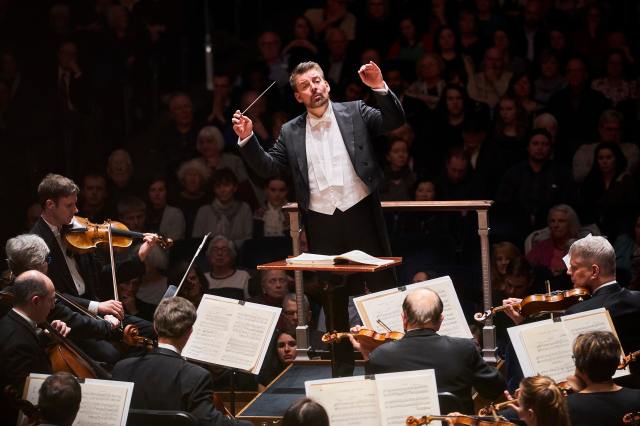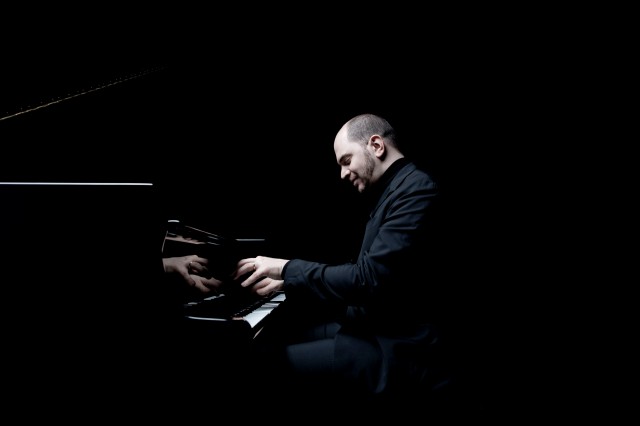Cleveland Orchestra
Matthias Pintscher, conductor
Kirill Gerstein, piano
Severance Hall
Cleveland, OH
November 1, 2018
Rachmaninov: Piano Concerto No. 3 in D minor, Op. 30
Encore:
Chopin: Waltz in A flat major, Op. 42
Bartók: The Wooden Prince, Op. 13, Sz. 60
A return appearance from former Daniel R. Lewis Young Composer Fellow Matthias Pintscher is always a welcome sight at Severance Hall. Pintscher’s program was comprised of two large-scale works, both from Eastern Europe, and both from the first decades of the 20th-century. Rachmaninov’s enduring Third Piano Concerto made for a meaty first half with Gilmore Artist Award winner Kirill Gerstein at the keyboard. The opening melody was haunting in its monastic simplicity, and never sentimentalized. Gerstein took matters at a fairly brisk tempo – at times feeling a bit rushed, but he always maintained a certain elegance. His commanding tone and massive dynamic range made the lasting impact, however – an unflagging intensity which paid its dividends especially in the cadenza. Gerstein elected for the larger of the two the composer supplied; beginning with a rumbling in the bass it built to immense power. The cadenza quite ingeniously also served as the movement’s recapitulation; without much left to say after that monstrosity the movement ended quietly, almost impressionistically.

A doleful lament marked the slow movement, encouraged by the choir of winds and long-bowed strings. Gerstein’s line was initially distressed but soon gave way to display his lyrical gift, and a multitude of moods were traversed, in turns scherzo-like, impassioned, and the sudden yet seamless transition to the finale. A vigorous march, bright and brilliant, offered no respite for Gerstein’s prodigious stamina and technical arsenal, up to and including the triumphant major-key ending in cascading glory. An encore was nearly demanded; Gerstein obliged with a Chopin waltz of effortless elegance.
Bartók’s The Wooden Prince, in only its third Cleveland Orchestra performance, was a foray into much less familiar territory. A one-act ballet spanning the continuum of nearly an hour, it is scored for an astonishingly large orchestra (some highlights: quadruple woodwinds – including two contrabassoons and two saxophones – an extensive percussion section, and four-hands celesta). The work began with a mysterious sounding drone (perhaps echoing Wagner’s Das Rheingold), firmly in a late-Romantic idiom. In many ways, this is a work in the tradition of Stravinsky’s groundbreaking scores for the Ballets Russes, with the intensity of some passages rivaling even that of the Rite.
The story of The Wooden Prince is a bit convoluted, but certain instruments representing specific characters served as a loose roadmap. The sweetly playful tone Afendi Yusuf’s clarinet deftly brought the princess’s coquettishness to life, and a folk melody in the low strings that would later resurface was quite striking. The dance between the princess and titular wooden prince (much to the chagrin of the real prince) was given with a relentless drive and folksy authenticity, with clever scoring emphasizing the prince’s wooden composition – castanets, xylophone, and col legno strings. Robert Walters’ fine English horn solo brought forth an apotheosis, buttressed by heavenly high strings (to my ears, another nod to Wagner, namely the prelude to Lohengrin). A happily-ever-after ending was achieved, marked by peaceful resolution and a sparkling celesta. Like the Rachmaninov that preceded, this was a supreme test of stamina and energy which Pintscher and the orchestra surmounted admirably. By happy coincidence (or smart programming), those interested in Pintscher’s other persona as a composer will have a chance to hear one of his works next week.

